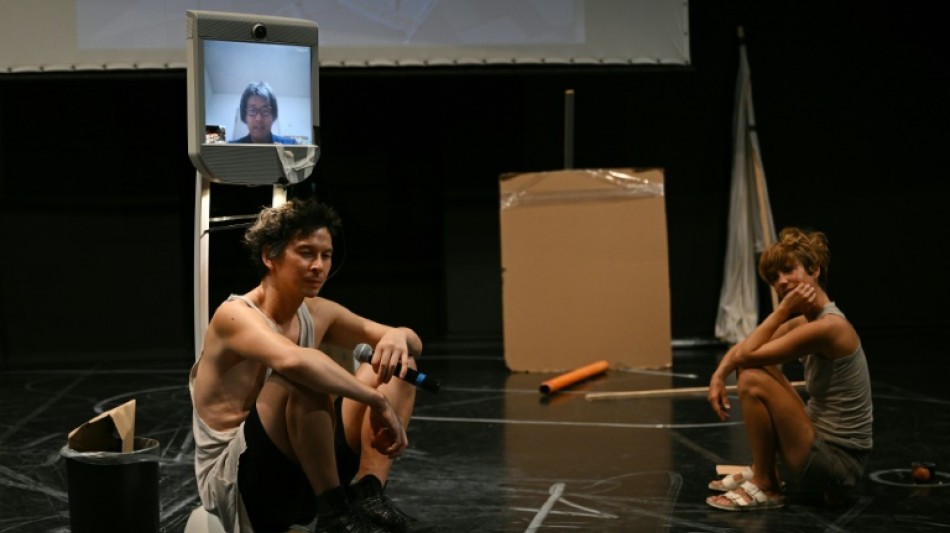
-
 Godolphin in full bloom as Desert Flower wins 1000 Guineas
Godolphin in full bloom as Desert Flower wins 1000 Guineas
-
Almeida wins Tour de Romandie as Evenepoel claims closing time-trial

-
 Bolsonaro leaves hospital three weeks after abdominal surgery
Bolsonaro leaves hospital three weeks after abdominal surgery
-
Man Utd crash at Brentford, Isak rescues Newcastle

-
 Romanians vote in tense presidential rerun as far right eyes win
Romanians vote in tense presidential rerun as far right eyes win
-
Lyon see off Racing to set up Challenge Cup final against Bath

-
 Kolkata survive Parag's six-hitting blitz to clinch IPL thriller
Kolkata survive Parag's six-hitting blitz to clinch IPL thriller
-
Israel vows retaliation against Yemen's Huthis over airport attack

-
 Mbappe maintains Real Madrid Liga dream in Celta thriller
Mbappe maintains Real Madrid Liga dream in Celta thriller
-
UNESCO says Nicaragua quitting over press prize award
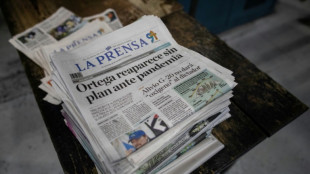
-
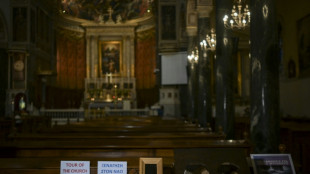 Church donation box goes digital in Greece
Church donation box goes digital in Greece
-
Germans mark liberation of Ravensbrueck Nazi camp
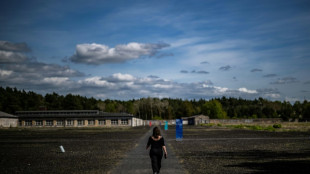
-
 Missile hits Israel airport area in Huthi-claimed attack
Missile hits Israel airport area in Huthi-claimed attack
-
DeChambeau eyes PGA Championship battle after South Korea LIV win

-
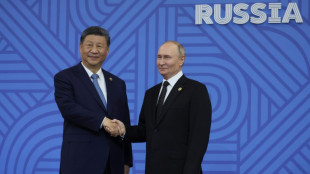 Chinese president to visit Russia on May 7-10: Kremlin
Chinese president to visit Russia on May 7-10: Kremlin
-
'We don't care': weddings go on in Pakistan's Kashmir border

-
 Missile hits Israel airport area in attack claimed by Yemen's Huthis
Missile hits Israel airport area in attack claimed by Yemen's Huthis
-
Mexican mayor arrested in probe of alleged drug cartel ranch: govt source
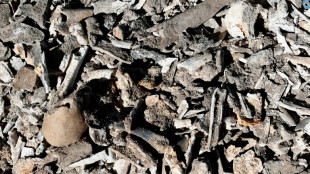
-
 Seven Iranians among eight arrested in UK counterterrorism probes
Seven Iranians among eight arrested in UK counterterrorism probes
-
Israel says area of airport hit after Yemen missile launch

-
 Romanians return to polls as far right hopes to win presidential rerun
Romanians return to polls as far right hopes to win presidential rerun
-
4 Iranians among 5 arrested in UK for 'terrorism offences': police

-
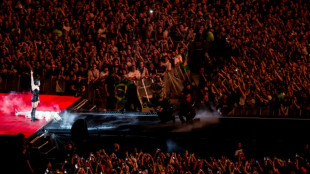 'Two million' throng Lady Gaga concert at Rio's Copacabana
'Two million' throng Lady Gaga concert at Rio's Copacabana
-
India-Pakistan gunfire triggers terror of past conflict
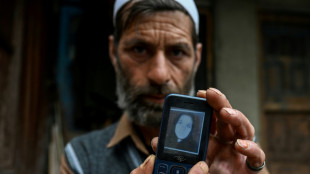
-
 UK hard right sets sights high after local election triumphs
UK hard right sets sights high after local election triumphs
-
Sexual abuse of nuns: one of the Catholic Church's last taboos

-
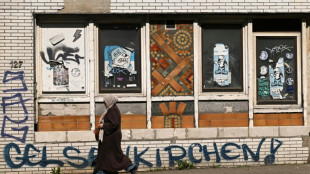 West German foothold of far-right AfD shows challenge for Merz
West German foothold of far-right AfD shows challenge for Merz
-
Maldives president holds record 15-hour press conference

-
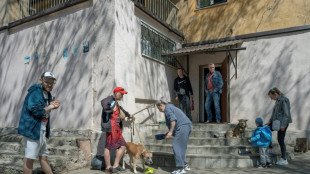 'Accept me': Near Ukraine front, a haven for outcasts
'Accept me': Near Ukraine front, a haven for outcasts
-
Canelo Alvarez unifies super middleweight titles on Saudi Arabia debut

-
 Canelo Alvarez unifes super middleweight titles on Saudi Arabia debut
Canelo Alvarez unifes super middleweight titles on Saudi Arabia debut
-
US Fed expected to pause cuts again and wait for clarity on tariffs

-
 Ex-Liverpool star Firmino 'proud' after more Champions League history
Ex-Liverpool star Firmino 'proud' after more Champions League history
-
Australian PM basks in win, vows 'orderly' government

-
 Qataris hooked on traditional fishing competition
Qataris hooked on traditional fishing competition
-
Mozart chocolate row leaves bitter taste in Austria
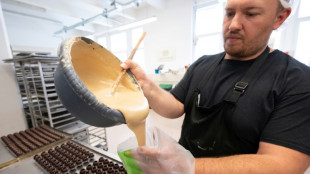
-
 US solar tariffs could drive Asia transition boom
US solar tariffs could drive Asia transition boom
-
Four-try Hurricane Sullivan says revenge fuelled Chiefs upset

-
 Nuggets rout Clippers to advance in NBA playoffs
Nuggets rout Clippers to advance in NBA playoffs
-
Scheffler shines in dark for eight-shot CJ Cup Byron Nelson lead

-
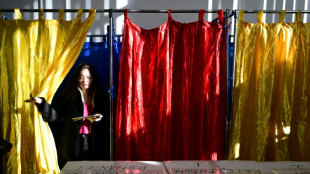 Romania returns to polls after annulled presidential vote
Romania returns to polls after annulled presidential vote
-
Easy vote turns Musk's dreams for Starbase city in Texas into reality

-
 Messi and Miami bounce back with 4-1 crushing of Red Bulls
Messi and Miami bounce back with 4-1 crushing of Red Bulls
-
US researchers seek to legitimize AI mental health care

-
 Ryu clings to two-shot lead at LPGA Black Desert Championship
Ryu clings to two-shot lead at LPGA Black Desert Championship
-
Ledecky, Walsh cap Pro Swim meet with world records
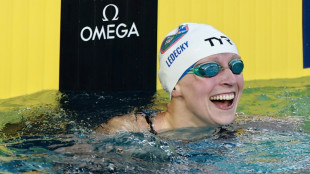
-
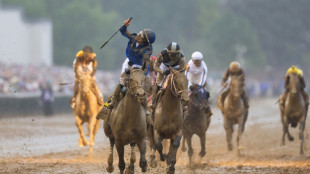 Sovereignty rules in 151st Kentucky Derby
Sovereignty rules in 151st Kentucky Derby
-
New to The Street Acquires 15% Equity Stake in CommercialVille, Launches National Media Campaign Featuring Patent-Backed Platform

-
 Prometheus Laboratories Presents Novel Data on Precision-Guided Care in IBD at DDW(R) 2025
Prometheus Laboratories Presents Novel Data on Precision-Guided Care in IBD at DDW(R) 2025
-
McLaughlin-Levrone sets world's fastest of year in 400m hurdles


Theatre project aims to ease isolation of Japan's social recluses
Disillusioned by work and tired of life, Seiji Yoshida withdrew from the world for seven years, but now he's taking part in a play about the experiences of Japan's "hikikomori", or social recluses.
The 42-year-old spent most of his thirties shut inside his home.
"I was going through the motions of life, but lying to myself. Apart from work, I had nothing. I'd just had enough," he told AFP at a workshop for the international production.
Yoshida was among more than a million Japanese aged 15 to 64 who lead highly reclusive lives, withdrawing from all social contact for at least six months, according to a 2020 government estimate.
Through an experimental theatre project, two French artists are hoping to offer hikikomori -- or "shut-ins" as they are often referred to in English -- a chance to express themselves and regain self-confidence.
Their play "Hiku" -- to be shown next year in France, Belgium and elsewhere in Europe -- aims to give hikikomori a platform for self-expression, while respecting their desire for isolation.
It features robots controlled by participants at home in Japan and voice recordings of conversations held through bedroom doors.
It also includes footage from small but noisy street demonstrations staged by hikikomori who are taking steps towards leaving their confinement -- but who feel oppressed by Japan's demanding work culture.
"We don't want to be forced to work! Stop oppressing us!" participants chanted at one demonstration filmed in the city of Takatsuki in western Japan.
Yoshida, who took part in the protest, told AFP he was "very proud" to be part of the theatre production.
- Robot 'avatars' -
The producers are working in Takatsuki with a local organisation, New Start Kansai, which provides support and company for hikikomori to help them gradually readjust to life in society.
"It's a social problem... but society has made (hikikomori) believe that the problem comes from them," said Atsutoshi Takahashi, a mediator at the association.
Nicolas Tajan, a psychoanalyst and associate professor at Kyoto University, said hikikomori often faced difficulties in childhood.
In Japan, "childhood and adolescent psychological difficulties are not addressed and not treated," he told AFP.
"That means in adulthood it can crystallise into a type of social withdrawal".
As adults, they face additional problems as they "are looked down on because they don't work," he added, noting that "work is really a very important part of Japanese identity."
Around a dozen recovering hikikomori are taking part in the project.
Some will control robots from 10,000 kilometres (6,200 miles) away during the play, painting messages on the floor and talking to spectators through microphones.
The robots are "a sort of avatar" to explore "being present and absent at the same time, a recurring theme for hikikomori," said co-director Eric Minh Cuong Castaing, a visual artist and dancer.
He hopes the production will help audiences reflect on their own lives, arguing that while hikikomori are sometimes regarded as weak, their actions represent a kind of resistance to being "a soldier in a suit and tie".
- 'Prejudices' -
When the French artists began researching the project in Japan, they took time to build connections with the isolated people introduced to them by New Start Kansai.
"It was a big challenge for some of them to let us into their homes and speak to us," said co-director Anne-Sophie Turion, who will perform in the play as a narrator.
She said being strangers from another country may have made things easier, "because the usual prejudices weren't there".
"We found people who we felt closer to than we ever could have imagined."
Recovery can be difficult for hikikomori, who fear once they have withdrawn from society, they won't be allowed back in, psychoanalyst Tajan said.
"This reinforces their avoidant behaviour."
But art can help reclusive individuals "reconnect with creativity" and envisage "another world" beyond psychiatric treatment or re-entering employment, he said.
Y.Nakamura--AMWN

